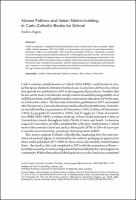Chapter Absent Fathers and Italian Nation-building in Carlo Collodi’s Books for School
Abstract
In this contribution, I analyse the schoolbooks of Carlo Collodi (born Carlo Lorenzini, 1826-1890), written between 1877 and 1890. In those years, the recently formed Italian State – declared in 1861 and completed in 1871 with the annexation of Rome – faced the necessity of constructing a shared national identity for a heterogeneous community. I examine how the representation of paternal figures is informed by Collodi’s pedagogical approach in his schoolbooks. Within the Italian nation-building, which had cultural and ideological nuances, the family was considered essential, and the padre played an undisputed authoritarian role. However, my analysis demonstrates how Collodi’s schoolbooks subvert that ideology through representing the dysfunctional paternal figure.
Keywords
Collodi; Italian Identity; Nation-building; Nineteenth Century; PinocchioDOI
10.36253/978-88-5518-597-4.06ISBN
9788855185974, 9788855185974Publisher
Firenze University PressPublisher website
https://www.fupress.com/Publication date and place
Florence, 2022Series
Biblioteca di Studi di Filologia Moderna, 66Classification
Biography, Literature and Literary studies


 Download
Download Web Shop
Web Shop